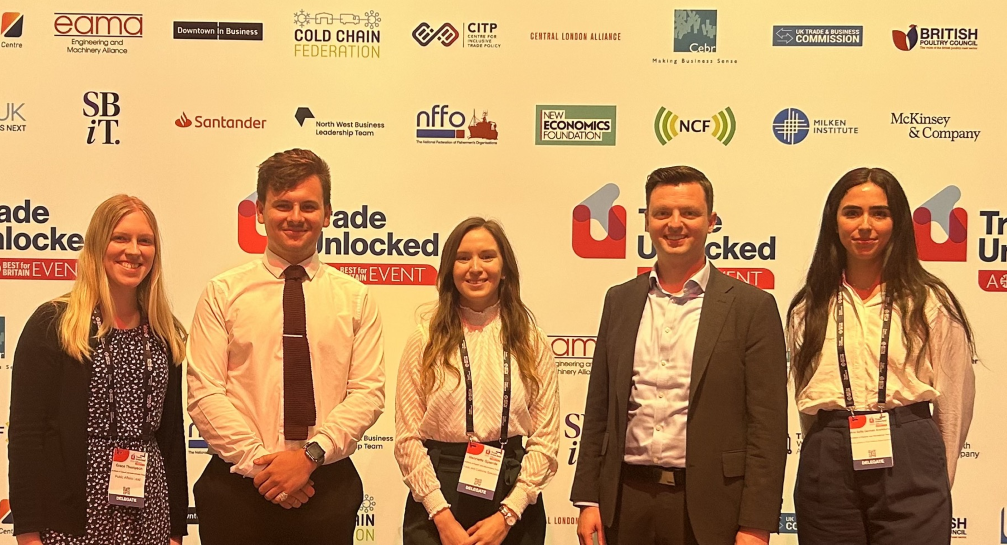
[Pictured: IOE&IT team at trade unlocked.
Left-to-right: Grace Thompson, Charlie Bowden, Henriette Gjaerde, Hunter Matson and Ana Sofia German ]
This week saw the Trade Unlocked Conference, hosted at the NEC in Birmingham 20-21 June, where high-level representatives from the trade community met to discuss the possible future of international trade.
The Institute of Export & International Trade (IOE&IT) sent a delegation to the conference to represent members’ views and check the pulse of international trade policy.
Below, they give their main takeaways from the gathering.
1. Supply chains
Grace Thompson, IOE&IT public affairs lead, said that a continued emphasis on supply chain resilience and critical minerals was her main takeaway.
“There was a focus on supply chains throughout the day, particularly around the need for more resilient and sustainable supply chains, especially post pandemic.”
She flagged Labour’s suggestion of a UK supply chain commission as “an interesting idea” and one to watch when more details are released.
“On a related note, China was a regular theme throughout the conference: it’s like the elephant in the room,” she said, noting that Labour’s shadow foreign secretary David Lammy stated that China was the largest producer of 12 out of the 18 critical minerals.
As reported previously by the IOE&IT Daily Update, Lammy signalled at the conference that his party would seek closer ties with the EU if it wins the next general election.
2. Trust is the future
Henriette Gjaerde, a trade and customs specialist, said that her main takeaway was that “trust” should play a significant role in UK trade policy for the foreseeable future.
“A key takeaway was the recognition of the need to change the focus from purely control to the important role of trust to drive sustainable progress and growth in international trade. Trust is important in order to build strong and stable relationships with international partners.”
3. Investment in people
Ana Sofia German, trade agreement specialist, said that one of the recurring themes was the importance of “empowering people and businesses in innovative sectors.”
“The panel on inward investment highlighted the lack of public investment in infrastructure over the past 15 years and its effects on the UK economy today.
“The panel emphasised the importance of public and private investment in infrastructure, research, and innovation in productive sectors such as artificial intelligence, telecommunications, quantum technologies, engineering biology, and semiconductors.”
4. Trade as a force for good
Charlie Bowden, public affairs intern, said his main takeaway would be that despite the range of panels on a variety of different topics, it was clear they were all united in creating a forum to discuss how trade can be a force for good:
“Most importantly, these discussions made it clear that businesses, individuals and policy makers all play a central role in these next steps, advocating the need for a bottom-up process of engagement and cooperation."



